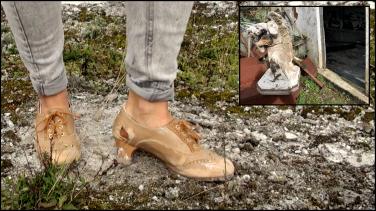
At death’s door, according to the cliché,
the whole life of the dying person passes before their eyes,
so now, at the gates of this death of a civilization,
is a good time for insomniac art,
enquiring thought,
stubborn poetry.
-Jorge Riechmann-
Firefly IV starts from a fundamental premise: for years we have been living immersed in a civilizational crisis. No one knows with certainty at what point in that crisis we find ourselves.
The past was blindness and excessive confidence in unlimited progress, the present is fear and uncertainty, and the future, perhaps, is only ruin and disorder.
What does it mean for our ethical systems to live in an “Age of Disorder” (2) controlled by large business corporations?
How does it affect our fragile and automated bodies?
How do we manage this “learning to die”?
How do we incorporate the death dances of the past into the chaotic future?
By way of preliminary conclusions, the work materials that we have been collecting during our residency in Tabakalera are presented as a starting point and, at the same time, a meeting place. From here we visit, recite and dance in order to address these and other questions.
Firefly IV is an encounter only possible from poetic-political images arising from the hybridisation of research and activities (musings, readings and other matters). In this presentation we will have the collaboration of the poet Jorge Riechmann.
(1) Jorge Riechmann has created his poem based on the essay of the same name by Roy Scranton:
“The biggest challenge we face is philosophical: understanding that this civilization is already dead. The sooner we come to terms with our situation and realise that there is nothing we can do to save ourselves, the sooner we will be able to undertake the difficult task of adapting, with mortal humility,
to our new reality.” Roy Scranton, Learning to Die in the Anthropocene. Reflections on the End of a Civilization, City Lights Books, San Francisco 2015.
(2) Deutsche Bank report 2020, after the outbreak of Covid-19, where the “reversal of an unbridled globalization” is mentioned.
By way of preliminary conclusions, the work materials that we have been collecting during our residency in Tabakalera are presented as a starting point and, at the same time, a meeting place. From here we visit, recite and dance in order to address these and other questions.
